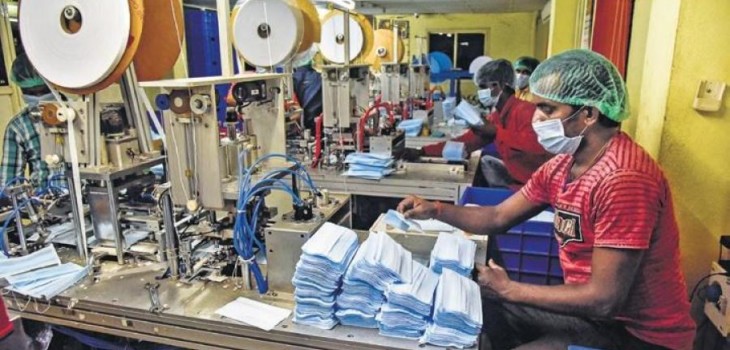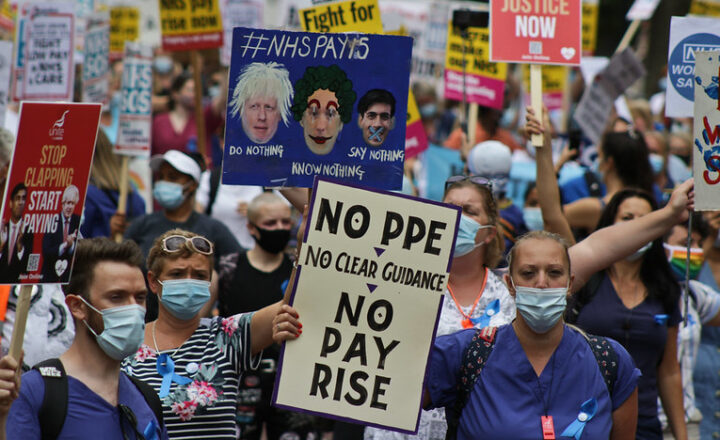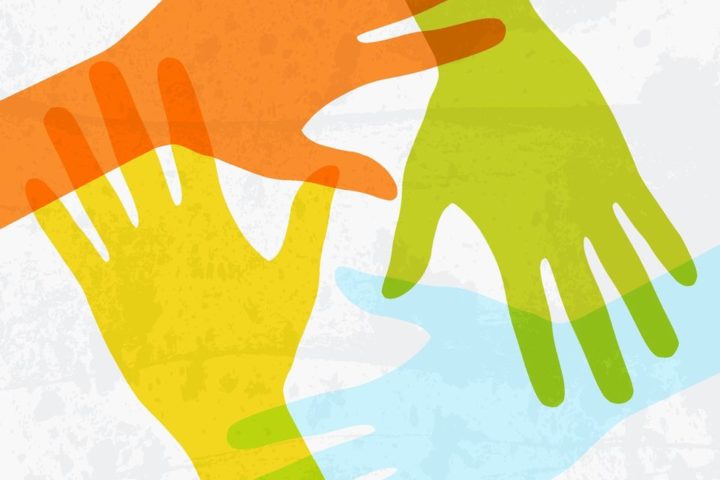The Corona virus is creating huge ruptures in the prison industrial complex, leading to the first instances of major corona-related social unrest and urgent calls for prisoner solidarity and prison abolition. Tens of thousands of prisoners are being released worldwide to mitigate the effects of the virus while those still confined experience deteriorating conditions and are exposed to ever greater risk of death. States continue to exploit prisoner labour to make masks and other items to sell during the pandemic, while prison riots and breakouts are errupting across the world.
Prisoner releases around the world
In recent days, countries around the world have been rapidly releasing people from prison to ease overcrowding, prevent deaths and mitigate the effects of the coronavirus on prisoner populations.
85,000 prisoners have been released in Iran to confront the outbreak. 30,000 are being released in Indonesia and 11,000 people are due to be released in Colombia. More than 100,000 are set to be released in Turkey.

A prison in Palangkaraya, Central Kalimantan, on Wednesday. (Antara Photo/Makna Zaezar)
In South Asia, 10,000 people have been released in Afghanistan where more than 80 prisoners have tested positive for COVID-19. Several states in India have begun releasing prisoners, including 11,000 in Utter Pradesh and Maharashtra. 3,000 people are due for release in Bangladesh. Meanwhile, Pakistan’s Supreme Court halted the release of more than 20,000 prisoners which local authorities had been set to send home.
The president of Algeria pardoned over 5,000 prisoners. 4,000 prisoners have been released in Ethiopia and 1,400 in Tunisia. Egypt released a limited number of political prisoners, while thousands remain behind bars. 1,486 detainees were released in Bahrain and 470 people were freed from detention centres in Yemen.
In Europe, 600 prisoners that are elderly or have chronic health issues have been released in Albania. 1,000 prisoners are also set to be released in northern Germany, with more states in the country expected to follow suit. 600 people have been released so far in Ireland. Less than 200 people will be released in Northern Ireland and only 50 people in Cyprus. 200 were also released prematurely in Azerbaijan. Releases from prisons in Poland are in the pipeline with legislative changes that could allow 20,000 people to be released under electronic supervision.
Public Health Disaster in the United States
In the United States, 900 people were released from Cuyahoga County Jail in Cleveland, Ohio; a jail plagued with deaths even before the virus. 1,100 ‘low level parole violators’ are set to be released from New York jails with the state being one of the worst hit by the virus. One Senior Doctor at Rikers Island Prison in New York, said the jail is a ‘public health disaster unfolding before our eyes’.
California also plans to release 3,500 people in jail but has not done so yet. This is a small percentage of the 122,000 people locked up in the state. A person in jail in Los Angeles described the situation as “slow torture” as they fear the spread of COVID-19 and don’t even have basic resources such as soap or toilet paper.
In Texas, Governor Greg Abbot blocked the release of prisoners that could not pay bail, meaning those without the financial means are left in prisons to face the pandemic. Estimates from US professionals predict that 100,000 people could die in US prisons during the pandemic.

Britain’s commitment to keeping people banged up
While thousands get released worldwide, England and Wales is a stark contrast. After public pressure, it is temporarily releasing 35 pregnant women. However, it’s 83,000 prison population will remain behind bars while it looks for new prisons.
It was reported in the Express that Justice Secretary Robert Buckland is considering plans to convert immigration detention centres and other buildings into prisons so that prisoners can follow social distancing guidelines rather than be released.
In the UK, 55 prisoners have tested positive across 21 prisons and three prisoners have already died. Epidemiologists from the University College London warn that 800 people could die in prison in England and Wales without urgent action taken.
Prison Labour exploited for the pandemic
States are now rapidly exploiting their captive labour forces to mobilise production for the pandemic.
In Turkey, prisoners have been producing 1.5million masks every month. Prisoners in Hyperbad, India are producing masks and sanitiser, while female prisoners in Hong Kong are reportedly working night shifts to manufacture masks. The Czech Prison Service announced prisoners will be making face masks too, while prisoners in Bosnia and Herzegovina are working 16 hour days to produce masks for market.
New York Governor Andrew Cuomo announced that prison labor will produce 100,000 gallons of hand sanitizer that will ‘smell like flowers’ while prisoners earn on average 65 cents an hour in the state. At Rikers Island, prisoners have been offered six dollars per hour and personal protective equipment to dig mass graves in preparation for the pandemic.

Prisoner Riots and Resistance
Prison riots have been triggered all over the world due to coronavirus fears and the living conditions most prisoners are subjected to.
23 prisoners lost their lives in a riot in Bogota, Colombia in a protest against unsanitary conditions. Migrants set fire to mattresses in a Detention Centre in Tabasco, Mexico, leaving one man dead. 84 prisoners escaped in Venezuela in a mass prison break. 26 prisoners were also injured in riots in Chile.
Riots broke out in three prisons in Iran, with allegations that guards had opened fire wounding prisoners. 74 prisoners escaped in a mass prison break and 50 remain on the run.
In early March, riots broke out across prisons in Italy. In one riot, twelve prisoners died and 16 people escaped. Another six died in a riot in Northern Italy in the same wave of rebellion, as prisoners protested conditions and being trapped inside during the pandemic.

Ten prisoners rioted in HMP Addiewell in Scotland. Three prisoners lost their lives in riots in Romania and two died in Jordan. Riots erupted in Lebanon with prisoners demanding release, and many using COVID-19 as a way to fight for longstanding demands for amnesty. Several people escaped prison in Thailand, after dozens of prisoners broke furniture and smashed windows. Nine prisoners escaped from a women’s prison in South Dakota after someone there tested positive for COVID-19.
One person died in India as police opened fire during a prison riot at Bengal’s biggest prison that locks up 2,500 people together. Two prisoners were also killed in a riot in Colombo, Sri Lanka, protesting conditions and the stopping of visits.
Riots have also been reported in Nigeria, Argentina and Sudan.
Prisoners are starting lawsuits all over the world. 180 detainees launched a hunger strike in Pennsylvania and 30 prisoners are on strike in Luxembourg.
These are only the prisoner acts of resistance that have made the news. Many more go undocumented.
Outside organising and agitation
Prisoner solidarity networks all over the world are agitating for the release of prisoners to prevent them dying in prison.
Community Action on Prison Expansion in the UK have been organising an online week of action with action alerts released each day – from emailing Prison Governors to lobbying the Ministry of Justice. There have also been calls to release children from youth prisons. Even the Prison Governors Association have been lobbying the state to release people.

‘Phone Zaps’ are one of the main forms of action, as call-outs go to people worldwide to phone certain institutions on different days to assert pressure and prisoner demands. One example is the campaign from Fight Toxic Prisons to release people in Alabama where prisoners are testing positive for COVID-19. Groups include ‘call scripts’ so people know what to say when calling.
Anarchist radio projects, including the Final Straw Radio and Kite Line are doing their best to amplify prisoner voices during the pandemic.
Groups are also fundraising for prisoner phone credit, as well as bail funds. An Emergency Release Fund that was originally created to raise bail money for trans prisoners is now being used for anyone who qualifies for cash bail in New York. The National Bail Fund Network serves a similar purpose for people in other parts of the United States.

In an interview with It’s Going Down, an organiser from Oakland Incarcerated Workers Organising Committee spoke about strategy at this time:
“Even though the strains, quarantines and pace of the crisis has dictated mainly hyper local and improvised responses from abolitionist groups, their responses have been fairly consistent tactically and in content across the country: maintaining connection with the inside both to support them and to get accurate reportage out; doing material jail support for releases as they get out and pressuring agencies and politicians to do three things:
- release people
- increase care and precautions inside and
- choke the flow of people into these facilities.
And the pressure tactics possible in this moment are phone zaps, media work, demand letters, and now pickets/noise demos with cars!”
It is clear we are living in unprecedented times, with many people feeling what it’s like to have restricted freedom of movement for perhaps the first time in their life. For millions of people worldwide, ‘lockdown’ is not new. For prisoners in the UK, they face even more time in absolute isolation as staff numbers reduce and measures are put in place to keep people separated. Campaigners fear incidences of self harm and suicide will increase.

One prisoner who spoke to Corporate Watch directly said:
“Everyone is locked in constantly. Self harming is getting worse. One girl threatened to take her life. People are going off their heads. Loosing tempers. Nobody is sleeping because everyone is worried about their families. People are running out of phone credit and not knowing what is going on with their family who are sick. Just when I thought prison couldn’t get any worse, it did.”
Prisoners, prisoner families and insiders are welcome to call London Anarchist Black Cross’s COVID-19 line to share updates on what is happening inside.

Campaigners are fighting hard and connecting the virus to long fought battles with the prison system. Gary Solomons from Community Action on Prison Expansion spoke powerfully that:
“The coronavirus pandemic has thrown the inhumane nature of the prison system into sharp relief and makes prison abolition ever more urgent. People inside are made more vulnerable to the virus because they are in prison where medical negligence and abuse have been every day occurrences, long before this crisis hit. Fear that loved ones will die in prison isn’t new either: deaths in prison, every one of them state murder, happen every day and if the British state do not release all prisoners urgently this pandemic will see many, many more.
Prisons can never be safe or humane. We reject suggestions that only those deemed ‘low risk’ should be released: an inherently racialised assessment that buys into the logic of the prison industrial complex. It’s time to free them all.”
Learn more
- Follow Free them All 2020 on instagram and twitter and COVID-19 Prisoner Solidarity on instagram for regular prison news
- Read Prison Island – Corporate Watch’s report on prison expansion in England, Wales and Scotland for an overview of the British prison system
- Get in touch with Community Action on Prison Expansion to help with the campaign




